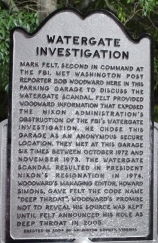Reviewing the year in media-mythbusting reveals a number of memorable posts. Here are the Media Myth Alert five top writeups of 2011, with a roster of other mythbusting posts of note:
■ Krakauer retreats from Lynch-source claim (posted November 11): This post revealed author Jon Krakauer’s quiet retreat from claims in a 2009 book that Jim Wilkinson, a former White House official, was the source for the bogus Washington Post report about Jessica Lynch and her supposed battlefield heroics in the Iraq War in 2003.
The claims in Krakauer’s book were unattributed — and vigorously denied by Wilkinson, who sought a correction.
When it came, the correction was inserted unobtrusively in a new printing of the paperback edition of Krakauer’s book, Where Men Win Glory. It read:
“Earlier editions of this book stated that it was Jim Wilkinson ‘who arranged to give the Washington Post exclusive access’ to this leaked intelligence [about Jessica Lynch]. This is incorrect. Wilkinson had nothing to do with the leak.”
I’ve noted that the Post’s enduring silence about its sources on the Lynch story has allowed for the emergence not only of false allegations such as those about Wilkinson, but of a false narrative that the military concocted the tale about Lynch’s derring-do.
The false narrative also has deflected attention from the soldier whose heroics apparently were misattributed to Lynch. He was Sgt. Donald Walters, a cook in Lynch’s unit.
■ ‘Deep Throat’ garage marker errs about Watergate source disclosures (posted August 18): A handsome historical marker went up in August outside the parking garage in Arlington, Virginia, where Bob Woodward of the Post conferred occasionally in 1972 and 1973 with his stealthy Watergate source, “Deep Throat.”
The marker, I pointed out, errs in describing the information Woodward received from the “Deep Throat” source, who in 2005 revealed himself as W. Mark Felt, formerly the FBI’s second in command.
“Felt provided Woodward information that exposed the Nixon administration’s obstruction of the FBI’s Watergate investigation.”
Which just isn’t so.
Such evidence, had “Deep Throat” offered it to Woodward, would have been so damaging and so explosive that it surely would have forced Richard Nixon to resign the presidency well before he did, in August 1974.
Felt didn’t have that sort of information — or (less likely) didn’t share it with Woodward.
I noted in my post about the marker that All the President’s Men, the book Woodward wrote with Carl Bernstein about their Watergate reporting, says Woodward’s conversations with “Deep Throat” were intended “only to confirm information that had been gathered elsewhere and to add some perspective.”
■ Bra-burning in Toronto: Confirmed (posted February 19): I ascertained in this post that an image of a bra-burning protest in Toronto in 1979 was no hoax, that the photograph was authentic.
I had not seen the photograph before it appeared in February with an article at the online site of London’s Guardian newspaper.
I had doubts about the photo’s authenticity — given the periodic claims that no bras ever were burned at a feminist protest. The Toronto image, I suspected, might have been unethically altered.
Turns out that was not the case.
I tracked down one of the participants at the Toronto protest and she confirmed the bra-burning, saying by phone from Vancouver:
“The photo is authentic. Absolutely. It happened.”
The participant was Vicki Trerise, who appears at the far right in the photograph above.
The photograph shows a moment of demonstrative bra-burning, although Trerise said it “wasn’t a focal point” of the protest, which took place not far from Toronto’s City Hall.
The bra-burning came near the end of the demonstration, which was called to protest what the organizers said was an illogical report about rape, prepared by the Ontario Provincial Police.
Trerise said the demonstrators in Toronto were media-savvy and “knew that if they burned a bra, someone would take their picture.”
■ Suspect Murrow quote pulled at Murrow school (posted February 17): The online welcome page of the dean of the Edward R. Murrow College of Communication at Washington State University contained a quotation attributed to Murrow that’s only half-true.
The quote reads:
“We must not confuse dissent with disloyalty. When the loyal opposition dies, I think the soul of America dies with it.”
As I’ve reported previously, the first portion of the quote was indeed spoken by Murrow, in his mythical 1954 television program that addressed Senator Joseph McCarthy’s red-baiting ways.
The second part of the quote — “When the loyal opposition dies, I think the soul of America dies with it” — is apocryphal.
In February, I found that the full quotation — accompanied by a facsimile of Murrow’s signature — was posted at the welcome page of Dean Lawrence Pintak of Murrow College at Washington State, Murrow’s alma mater.
I asked the dean what knew about the quote’s provenance, noting that I had consulted, among other sources, a database of historical newspapers which contained no articles quoting the “loyal opposition” passage.
Pintak referred my inquiry to an instructor on his faculty who, a few hours later, sent an email to the dean and me, stating:
“While [the ‘loyal opposition’ quotation] seems to reflect the Murrow spirit, the lack of evidence that he phrased it that way is indeed suspicious.”
He added: “I feel the evidence says no, Murrow did not say this.”
By day’s end, the suspect quote had been pulled from the welcome page. Just the authentic portion — “We must not confuse dissent with disloyalty” — remained posted there.
■ Mythmaking in Moscow: Biden says WaPo brought down Nixon (posted March 12): Joe Biden, the hapless U.S. vice president, repeated the dominant but misleading narrative about the Watergate scandal in March by telling an audience in Moscow that the Washington Post had “brought down” Richard Nixon’s corrupt presidency.
The gaffe-prone Biden told his audience:
“In my country it was a newspaper, not the FBI, or the Justice Department, it was a newspaper, the Washington Post that brought down a President for illegal actions.”
It’s a version of scandal that few serious historians accept. Not even the Washington Post buys into such a myth-encrusted interpretation.
Indeed, principals at the Post from time to time have sought to distance the newspaper from that misleading assessment.
For example, Katharine Graham, the newspaper’s publisher during and after the Watergate scandal, said in 1997, at a program marking the 25th anniversary of the scandal:
“Sometimes people accuse us of bringing down a president, which of course we didn’t do. The processes that caused [Nixon’s] resignation were constitutional.”
More recently, Michael Getler, then the newspaper’s ombudsman, wrote in 2005:
“Ultimately, it was not The Post, but the FBI, a Congress acting in bipartisan fashion and the courts that brought down the Nixon administration.”
Such comments are not the expressions of false modesty. Instead, they represent a more accurate reading of the history of Watergate than Biden offered up in Moscow.
Even so, in the run-up to the scandal’s 40th anniversary in 2012, the Watergate myth — the heroic-journalist trope — is sure to emerge often and insistently.
But the Post and its reporting of Watergate assuredly did not bring down Nixon, as I discuss in Getting It Wrong, my latest book which was published in 2010.
Many thanks to Instapundit
Glenn Reynolds for linking to this post.
Other memorable posts of 2011:
- The debunking of the year, 2011
- ‘Too early to say’: Zhou was speaking about 1968, not 1789
- As if it were toxic: Media ignore exculpatory Jefferson-paternity study
- Carl Bernstein, disingenuous
- BBC calls Hearst’s quote apocryphal, quotes it anyway
- Apocryphal, but still quotable
- Indulging in myth on the way out
- Area 51 book offers implausible, myth-based tale
- Juan Williams’ new book repeats Spanish-American War myth
- NYTimes flubs the correction
- When we err, we correct: Still waiting, Bill Keller
- Fact-checking Keller on NYT-Bay of Pigs suppression myth
- Fact-checking WaPo columnist on the ‘McKinley Moment’
- No ‘rock-em,’ no ‘sock-em’: What ails WaPo?
- WaPo journo on Jessica Lynch story rejoins paper
- JHistory: ‘Getting It Wrong’ deserves to be ‘required reading’
- Accepting the 2010 SPJ award for Research about Journalism





[…] PROF. JOSEPH CAMPBELL: The Year In Media Mythbusting. […]
[…] Media Myth Alert […]
[…] on the appearance of many prominent media-driven myths and errors. Here are the year’s five top writeups, followed by a roster of other mythbusting posts of […]